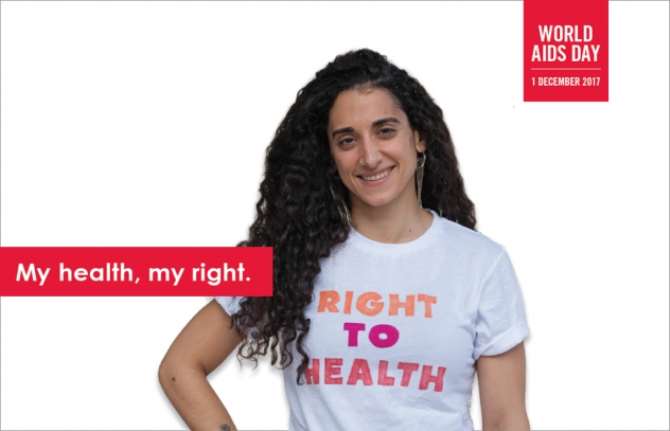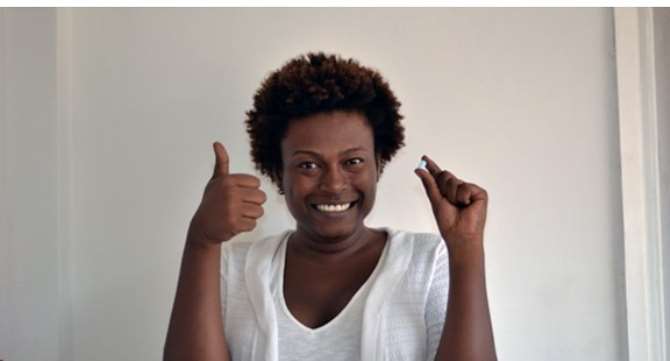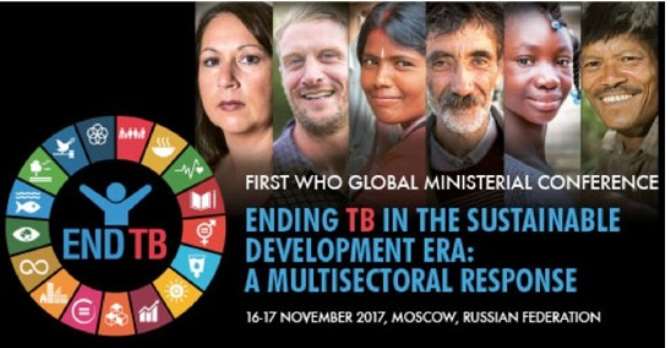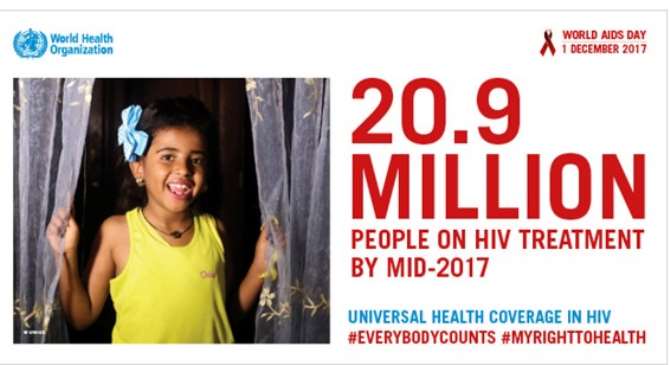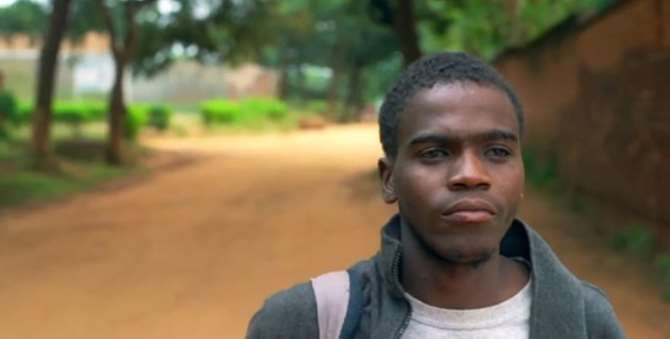The World Aids Day 2017

The theme for this year’s World Aids Day is My Health, My Right, and it focuses on the right to health. It goes further to explore the challenges people around the world face in exercising their rights to good health. This right to good health is contained in the 1966 International Covenant on Economic, Social and Cultural Rights as the right of everyone to the enjoyment of the highest attainable standard of physical and mental health. It comprises the right of everyone to the prevention and treatment of ill health, to make decisions about one’s own health and to be treated with respect and dignity .We should not forget in a hurry that if a person’s right to health is compromised, they are often unable to effectively prevent disease and ill health, including HIV, or to gain access to treatment and care. The most marginalized people in the society, including ,but not limited to, the poor and the downtrodden, commercial sex workers, people who inject drugs, men who have sex with men, people in prisons and migrants, are often the least able to access their right to health;they are also the most vulnerable to HIV.
This 1966 International Covenant on Economic, Social and Cultural Rights is in consonance with the Nigeria’s constitution, s.34 (1), which states that:
Every individual is entitled to respect for the dignity of his person, and accordingly -
(a) no person shall be subjected to torture or to inhuman or degrading treatment;
(b) no person shall he held in slavery or servitude; and
(c) no person shall be required to perform forced or compulsory labour.
Everyone should be allowed to make decisions about one’s own health hence women should be allowed to decide the pregnancy they intend to carry to term and the one they are not physically and mentally ready to carry to term as contained in s.38(1) of our constitution which states that :
‘Every person shall be entitled to freedom of thought, conscience ......’
Also,s.11 of the Child Rights Act states that :
Every child is entitled to respect for the dignity of his person, and accordingly, no child shall
be—
(a) subjected to physical, mental or emotional injury, abuse, neglect or maltreatment, including
sexual abuse; or
(b) subjected to torture, inhuman or degrading treatment or punishment; or
(c) subjected to attacks upon his honor or reputation; or
(d) held in slavery or servitude, while in the care of a parent, legal guardian or school authority or
any other person or authority having the care of the child.
The Nigerian Child has a right to health
In the same vein ,s.13 of the Child Rights Act states that :
(1) Every child is entitled to enjoy the best attainable state of physical, mental and spiritual
health.
(2) Every Government, parent, guardian, institution, service, agency, organisation or body responsible for the care of a child shall endeavour to provide for the child the best attainable state of health.
(3) Every Government in Nigeria shall—
(a) endeavour to reduce infant and child mortality rate;
(b) ensure the provision of necessary medical assistance and health care services to all children with
emphasis on the development of primary health care;
(c) ensure the provision of adequate nutrition and safe drinking water;
(d) ensure the provision of good hygiene and environmental sanitation;
(e) combat disease and malnutrition within the framework of primary health care through the application
of appropriate technology;
(f) ensure appropriate health care for expectant and nursing mothers; and
(g) support, through technical and financial means, the mobilisation of national and local community
resources in the development of primary health care for children.
(4) Every parent, guardian or person having the care and custody or a child under the age of two years shall ensure that the child is provided with full immunization.
(5) Every parent, guardian or person having the care of a child who fails in the duty imposed on him
under Subsection (4) of this section commits an offence and is liable on conviction for—
(a) a first offence, to a fine not exceeding five thousand Naira; and
(b) a second or any subsequent offence, whether in respect of that child or any other child, to imprisonment for a term not exceeding one month.
(6) The court may make, in substitution for or addition to any penalty stipulated under Subsection (5) of this section, an order compelling the parent or guardian of a child to get the child immunized.
I need not talk about child marriage and child betrothal as contained in sections 21 and 22 of the Child Rights Act respectively and punishable under s.23 of the same Act.
UNAIDS, the originator of this year’s theme, maintains that My Health, My Right theme/campaign encourages people to share their views and concerns around ensuring their own right to health and to create a movement highlighting the importance of erasing health inequalities.
HIV campaign continues
The first world AIDS day was held about 29 years ago (1988) after health ministers from around the world met in London and agreed to such a day as a way of highlighting the enormity of the AIDS pandemic and nation's responsibility to ensure universal treatment, care and support for people living with HIV and AIDS.
Meanwhile, the idea was conceived in 1987 by two public information officers, James Bunn and Thomas Netter, who were workers of the WHO's global programme on AIDS but the final approval was given by Dr Jonathan Mann ,former head of the Global programme on AIDS but now known as UNAIDS . It is observed annually on the first day of December. It is recognized by the UN and all her affiliate international organisations and member countries.
BRIEF HISTORY AND DESCRIPTION
In 1981, medical practitioners in USA discovered a strange illness among a small number of gay men. The illness was given several names until it was finally called HIV AIDS. It is one of the leading causes of death globally. HIV progressively infects cells of the immune system (especially CD4 cells of the white blood cells), breaking down the body's ability to fend off some infections and other diseases .AIDS is the most advanced stage of HIV infection, defined by the occurrence of any of the more than 20 opportunistic infections or related cancers.
MODES OF TRANSMISSION
HIV can be transmitted through: transfusion of contaminated blood and blood products; unprotected vaginal or anal sexual intercourse ; oral sex with an infected person; transmission between an infected mother and her baby during pregnancy, childbirth and breastfeeding ; sharing of contaminated sharp instruments and the use of contaminated and unsterilized hospital equipment such as needles and syringes.
STATISTICS AND DATA
According to the WHO, there were approximately 36.7 million people living with HIV at the end of 2016 and about 20.9 million people living with HIV were receiving Anti Retroviral Therapy by mid-2017. About 7 out of 10 pregnant women living with HIV received antiretroviral treatment. . HIV remains a major global public health issue having claimed more than 34 million lives so far .At the end of 2014, about 37(34.3-41.4) million people were living with the virus with 2.0( 1.9-2.2) million people becoming newly infected with HIV . Sub-Saharan Africa is the most affected region, with 25.8(24.0-28.7) million people living with HIV in 2014, accounting for about 70% of the global total number of new HIV infections .About 51% of people with HIV knows their status. In 2014 alone, about 150 million children and adults in 129 low and middle income countries received HIV testing services .Also in 2014 ,14.9 million ,about 40%,of people living with HIV were receiving ART ( Anti-retroviral Therapy) of which 13.5 million were receiving ART in low and middle income countries. About 1.2(1.0-1.5) million people died from HIV related causes globally. The World Health Organisation (WHO) maintains that:
- HIV continues to be a major global public health issue, having claimed more than 35 million lives so far. In 2016, 1.0 million people died from HIV-related causes globally.
- There were approximately 36.7 million people living with HIV at the end of 2016 with 1.8 million people becoming newly infected in 2016 globally.
- 54% of adults and 43% of children living with HIV are currently receiving lifelong antiretroviral therapy (ART).
- Global ART coverage for pregnant and breastfeeding women living with HIV is high at 76% .
- The WHO African Region is the most affected region, with 25.6 million people living with HIV in 2016. The African region also accounts for almost two thirds of the global total of new HIV infections.
- HIV infection is often diagnosed through rapid diagnostic tests (RDTs), which detect the presence or absence of HIV antibodies. Most often these tests provide same-day test results, which are essential for same day diagnosis and early treatment and care.
- Key populations are groups who are at increased risk of HIV irrespective of epidemic type or local context. They include: men who have sex with men, people who inject drugs, people in prisons and other closed settings, sex workers and their clients, and transgender people.
- Key populations often have legal and social issues related to their behaviours that increase vulnerability to HIV and reduce access to testing and treatment programmes.
- In 2015, an estimated 44% of new infections occurred among key populations and their partners.
- There is no cure for HIV infection. However, effective antiretroviral (ARV) drugs can control the virus and help prevent transmission so that people with HIV, and those at substantial risk, can enjoy healthy, long and productive lives.
- It is estimated that currently only 70% of people with HIV know their status. To reach the target of 90%, an additional 7.5 million people need to access HIV testing services. In mid-2017, 20.9 million people living with HIV were receiving antiretroviral therapy (ART) globally.
- Between 2000 and 2016, new HIV infections fell by 39%, and HIV-related deaths fell by one third with 13.1 million lives saved due to ART in the same period. This achievement was the result of great efforts by national HIV programmes supported by civil society and a range of development partners.
SIGNS AND SYMPTOMS
The symptoms vary according to the stage of the disease .About 49 % of the people living with the virus are unaware .This is worsened by the fact that the disease may be symptomless for a period of time or may present with influenza-like illness such as fever ,headache ,rash or sore-throat.
However, as the infection progresses ,it will affect the immune system adversely hence the person can show features such as swollen lymph nodes, diarrhoea and cough lasting for more than a month, unaccounted weight loss etc. When treatment is not started and the infection is allowed to progressed uncontrolled, the patient may develop opportunistic infections and other AIDS-related diseases such as Pulmonary Tuberculosis ,Cancers such as Lymphomas, Kaposi's sarcoma etc
THE WAY FORWARD
the first requirement is for everybody to go for Voluntary Counselling and Testing (VCT) in order to ascertain one's HIV status .When positive, the individual should leave positively and if negative, the individual should avoid being infected .For us to maintain an HIV free generation, the following must be considered and properly implemented:
WHO continues with the supplies?
ATTITUDINAL CHANGE
Nigeria and other African countries should abhor some obnoxious cultural practices that help in the spread of the virus. On May 8th 2006, a Johannesburg High court acquitted Jacob G. Zuma, the current president of South Africa and current president of the governing political party, African National Congress (ANC) ,of rape charge brought against him in December 6th 2005. The accuser (the victim), a daughter of Zuma's deceased friend was known to Zuma to be HIV positive. President Zuma argued in court that he had shower immediately after having an unprotected sex with the known HIV patient to cut down the risk of contracting the dreaded disease .The court finally dismissed the case on the grounds that the sex was consensual but Zuma's defence of having showers after the unprotected sex with a known HIV patient was condemned by health experts, AIDS activists and the general public.
Also, a former president in that country once said that the happiest day in his life was the day he was circumcised. Although from medical perspectives, circumcision reduces the rate of HIV transmission but the way people were circumcised in South Africa where one sharp object was used to circumcise everybody present, really helped in the spread of the virus in that country .
TB at times occurs among the people living with HIV
THE ACTIVITIES OF SOME RELIGIOUS LEADERS
I have witnessed, in the course of my medical practice, many lives that were lost due to the activities of these religious leaders. Some of them claim to have cure for HIV and other diseases hence anybody that is newly diagnosed with HIV will prefer wasting his/her time with these religious leaders only to come back to the hospital when the disease has reached an advanced stage, when the opportunistic infections and HIV related cancers must have been established. At that stage , medical science may have little or nothing to offer to these individuals .
SERODISCORDANT COUPLE
This situation occurs when one partner tested positive to the virus while the other partner remains negative. The partner that is positive must be placed on ART no matter the CD 4 count in order to protect the other partner that is negative from being infected. They should also use barrier method of contraception according to WHO standard unless when they are ready for conception.
INCESSANT STRIKES IN THE HEALTH SECTOR
When a particular group wants to embark on any strike, the group must ensure that an alternative arrangement is made so that these HIV patients can get their drugs as at when due .
OTHER WAYS:
Federal Road Safety Corps (FRSC) should make it compulsory for each vehicle to have a packet of latex gloves .This is because many Nigerians are now aware that one can get infected through contaminated blood hence at times when a road traffic accident occurred ,victims that would have been saved had they been rushed to the nearest hospital ,normally lost their lives because people would wait for FRSC officials to arrive with safety hand gloves. More unfortunate is the fact that it may take some time for the FRSC officials to arrive at the venue . I will certainly not blame those who refuse to help the accident victims without medical hand gloves because the good Samaritans' health is as important as the victims' health.
Taking the campaign to rural settings
Also, I think the National Agency for the Control of Aids ( NACA) should map out strategies to go to our rural settings to enlighten the masses because many people in those settings are still naive of this deadly virus .NACA can as well go to secondary schools in order to enlighten the fledgling students there and Sex education can also be included in our academic curricula .
People should be enlightened on the ways of transmission of the virus and how to avoid them through safe sexual and good hospital practices , Safe antenatal and postnatal care ,Proper use of uncontaminated sharp objects/instruments and safe disposal of contaminated objects etc .The Government, at the federal, state and local government levels, needs to do more in ensuring that not only the ART drugs but also other tests and services should be rendered free to the HIV patients .In some settings ,some of them are mandated to pay for laboratory services hence those that don't have the money for the tests may not be able access full medical treatment .If Nigeria is truly the Africa's largest economy ,I think we don't need to overemphasized on the need for all services and treatments to be rendered free to the victims of HIV infections .A legislation can also be enacted to ensure that each of these multinational companies contributes a particular percentage ( even if it is 1%) of their income to the HIV campaign . All forms of discrimination against people living with the virus must be discriminated at all costs and it will also be made a criminal offence if one intentionally infects another with the deadly virus.

